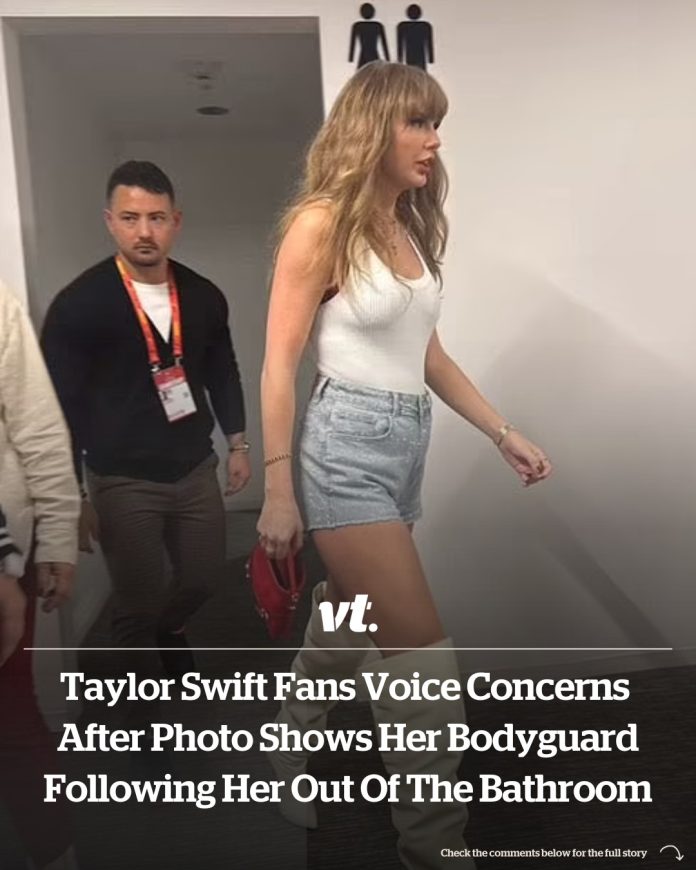In the realm of celebrity life, privacy often becomes a luxury rather than a given. This reality was starkly highlighted when a photograph of Taylor Swift exiting a bathroom, closely followed by her bodyguard, went viral. The image ignited widespread discussions about the extent of security measures necessary for high-profile individuals and the personal boundaries they must navigate.
The Incident at Super Bowl LIX
On February 9, 2025, during Super Bowl LIX held in New Orleans, Taylor Swift attended the event to support her boyfriend, Kansas City Chiefs tight end Travis Kelce. Amid the high-energy atmosphere, an image captured Swift leaving a restroom with her bodyguard, Drew, closely trailing her. This photograph quickly circulated online, prompting fans and the public to express a mix of concern and empathy.

Fan Reactions and Public Discourse
The image spurred a multitude of reactions across social media platforms. Many fans expressed sadness over the apparent necessity for such stringent security measures, even in private spaces. Comments ranged from lamenting her lack of solitude to criticizing the invasive behavior of individuals waiting outside restrooms for a glimpse of the star. One fan poignantly noted, “It’s so sad honestly,” highlighting the emotional resonance the image had with the public.
Others defended the heightened security, citing Swift’s history of dealing with overzealous fans and potential threats. The presence of her bodyguard in such close quarters was seen by some as a necessary precaution to ensure her safety in unpredictable public settings. This perspective underscores the delicate balance celebrities must maintain between accessibility and personal security.
The Role of Security in Celebrity Life
Taylor Swift’s experiences are emblematic of the broader challenges faced by public figures in maintaining personal safety. Incidents involving intrusive behavior from fans and paparazzi have necessitated robust security protocols. For instance, during a previous event at Arrowhead Stadium, Swift’s bodyguards were observed instructing photographers to “stand up” to prevent invasive shots, highlighting proactive measures taken to protect her privacy.
These measures, while essential, often blur the lines between personal space and security needs. The presence of security personnel in intimate settings, such as restrooms, raises questions about the extent to which personal boundaries are compromised in the name of safety.
The Broader Implications of Invasive Photography
The incident also sheds light on the pervasive issue of invasive photography and the lengths to which celebrities must go to protect themselves. The act of individuals waiting outside restrooms to capture private moments speaks to a broader societal issue regarding the consumption of celebrity culture. This behavior not only infringes upon personal privacy but also perpetuates a cycle where intrusive actions are normalized in the pursuit of exclusive content.
Navigating Public Life and Personal Boundaries
For celebrities like Taylor Swift, the interplay between public appearances and personal boundaries is a constant negotiation. The necessity of having security personnel in close proximity, even in private moments, underscores the challenges of leading a life under continuous public scrutiny. While fans’ desire for connection and insight into their idols’ lives is understandable, it is imperative to recognize and respect the personal spaces and boundaries of public figures.

Conclusion
The viral image of Taylor Swift exiting a bathroom with her bodyguard in tow serves as a poignant reminder of the complexities surrounding celebrity privacy and security. It highlights the fine line between ensuring personal safety and maintaining personal boundaries in an era where public figures are under relentless observation. As discussions continue, it becomes increasingly important to foster a culture that respects the privacy of individuals, regardless of their public status, and acknowledges the human need for personal space amidst the demands of fame.

















